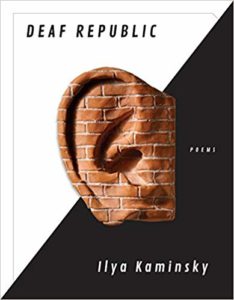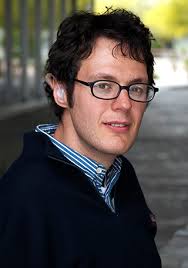Deaf Republic, the new collection of poetry by Ilya Kaminsky, is striking on at least two counts, and possibly a third.
First, it is a story, a narrative “in two acts,” that uses the poetic form. The 59 poems are a collective whole, tightly connected to the point where it’s difficult to imagine any of them apart from their fellow poems. The poems work like a narrative thread, weaving together people and events into a coherent whole. The narrative’s two acts read almost like a play, and to emphasize that connection, the work includes a “dramatis personae,” or list of characters.
The second striking feature is what the story is about—a time of trouble in an occupied country, set in the town of Vasenka. The occupation might be from the political left or the political right; the viewpoint is not important. The occupying soldiers are present; the people are feeling a kind of suffocation. Freedom and citizens’ rights are no longer functioning words and ideas. A command is given; all the people obey, except for a child, a boy who is deaf. He reacts with joy because he can’t hear that the soldiers are ordering the people to disperse, because assemblies are prohibited. He is shot dead, setting into motion a series of events that will lead to more tragedy.
And yet. The third striking feature is a narrative in poetic form about the loss of freedom in which the form and the substance work together to offer hope and redemption. It is a most curious experience to read a work like this one and finish, almost impossibly, with a sense of hope.
Alfonso and Sonya are a young couple expecting their first child. Sonya’s young cousin is Petya, the deaf boy. The people are in the town square, watching a puppet show, when the soldiers arrive and order people to disperse. Petya is laughing at what happens in the puppet show, and a soldier shoots him dead. Sonya, in her grief, lies by the boy’s body and covers him with her own. After her baby, a little girl named Anushka, is born, Sonya is taken away. Her husband, who wants to be a great poet, knows what has likely happened to her and yet still holds onto hope.
To Live

But love is not enough—
the heart needs a little foolishness!
For our child I fold the newspaper, make a hat
and pretend to Sonya that I am the greatest poet
and she pretends to be alive—
my Sonya, her stories and her eloquent legs,
her legs and stories that open other stories.
(Stop talking while we are kissing!)
I see myself—a yellow raincoat,
a sandwich, a piece of tomato between my teeth,
I hoist our infant Anushka to the sky—
(Old fool, my wife might have laughed)
I am singing as she pisses
on my forehead and shoulders!
The story continues. More tragedies occur, yet hope still burns. And the hope is demonstrated in a most curious way—all of the people stop hearing.

Ilya Kaminsky
Born in the former Soviet Union in 1977, Kaminsky and his family were granted asylum by the United States in 1993. His previously published collection of poetry, Dancing in Odessa (2004), won the Whiting Writers’ Award in poetry, the American Academy of Arts and Letters’ Metcalf Award, the Dorset Prize, and the Ruth Lilly Fellowship. Currently, he holds the Bourne Chair in Poetry at Georgia Institute of Technology and lives in Atlanta.
Deaf Republic is a thought-provoking and heart-provoking work. Kaminsky simultaneously manages to convey both inevitability—we know how this has to end—and a sense that, whatever might happen, the human heart still beats to the sound of freedom and dignity.
Related:
National Poetry Month: Ilya Kaminsky
Photo by Unsettler, Creative Commons, via Flickr. Post by Glynn Young.
__________________________

“I require all our incoming poetry students—in the MFA I direct—to buy and read this book.”
—Jeanetta Calhoun Mish
- Longfellow’s “Paul Revere’s Ride”: Creating a National Legend - April 17, 2025
- Poets and Poems: Katie Kalisz and “Flu Season” - April 15, 2025
- Poets and Poems: Michelle Ortega and “When You Ask Me, Why Paris?” - April 10, 2025

L.L. Barkat says
This sounds like a remarkable collection. Oh, that poem. That poem.
Glynn says
The entire collection is like this. At times, the sense of loss is overwhelming.
Maureen says
He’s a marvelous poet.
There is a BBC presentation of the work that is wonderful. I shared the link on my FB page a few days ago.
Glynn says
Here is the link to Maureen’s post, which has several links to information about the poet. https://writingwithoutpaper.blogspot.com/2019/03/thought-for-day_31.html
Bethany R. says
Wow, thank you for this post. “The heart needs a little foolishness!” A little room to imagine things might turn out okay.
Laurie Klein says
Thanks for pointing me toward this collection, Glynn. I found it heart-wrenching yet alive with unexpected details and glimmers of hope.